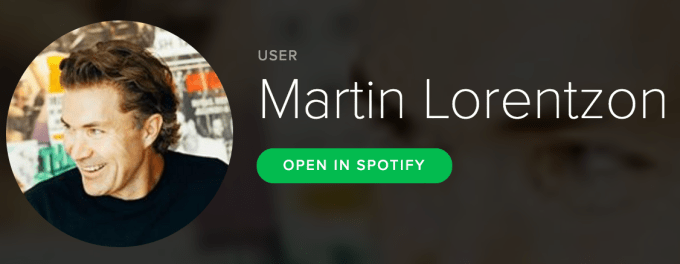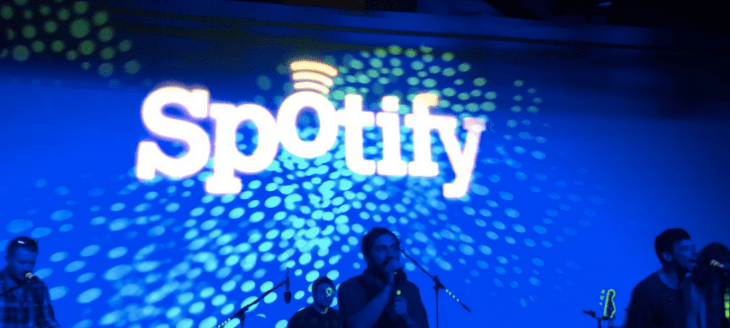A changing of the guard is underway at Spotify, the streaming music service with 40 million paying users and over 100 million overall that competes with the likes of Apple Music, Google Music, Pandora and now Amazon. Co-founder Martin Lorentzon announced (in Swedish) that he is stepping down as chairman of the company. Co-founder Daniel Ek will take on the role alongside his other position as CEO, while Lorentzon will downgrade to the��position of vice-chairman.
Spotify has confirmed the moves to us but has provided no further comment.
 Lorentzon — pictured, right, from his own Spotify profile (his exec bio has been taken down for now it seems for updating) — has a number of other roles in the Swedish business world. Among them he is a board member at Telia Sonera, Sweden’s national carrier, which took a $115 million investment at an $8.53 valuation in the company in June 2015 (giving Spotify its last and most current valuation).
Lorentzon — pictured, right, from his own Spotify profile (his exec bio has been taken down for now it seems for updating) — has a number of other roles in the Swedish business world. Among them he is a board member at Telia Sonera, Sweden’s national carrier, which took a $115 million investment at an $8.53 valuation in the company in June 2015 (giving Spotify its last and most current valuation).
Ek, meanwhile, appears to be consolidating more power and authority at the company. After the company’s chief revenue officer, Jeff Levick, departed the company in October, the subscriber team that reported to Levick now report to Ek as part of a wider reorganization. (Ek’s not taking on all CRO duties: the sales team that also reported to Levick now report to CFO Barry McCarthy.)
The changes come as we hear increasing talk of an IPO for the company, which was founded in Stockholm but incorporated in the UK and with offices in New York (where Daniel Ek himself is based). The latest we’ve heard from sources is that the company is planning file by the end of this year, with a public listing in 2017.
If the appointment of Ek in Lorentzon’s place is a permanent arrangement, it could be a sign that Spotify is simplifying its structure ahead of a public listing, potentially in the U.S., where the company has been gradually shifting its business centre.
To be fair, there have been rumors of a Spotify IPO for years now.
In January 2016, Spotify quietly went out to raise an “opportunistic” $500 million in convertible notes from Swedish investors, with those notes specifically pegged to an IPO plan. If the IPO happened within a year of the investment, investors would get a 17.5% discount on shares; if it’s more than a year away, the discount will increase 2.5 percentage points every six months. At the time, Spotify had been considering a joint listing in Stockholm and the U.S.
In March, the company confirmed another whopping $1 billion in debt with even stronger terms. Investors TPG and Dragoneer can convert their debt to equity at a 20% discount of whatever share price Spotify sets for an eventual IPO. If Spotify didn’t IPO within a year, that discount goes up 2.5% every extra six months. That’s on top of the 5% annual interest Spotify would pay on the debt, and 1% more every six months up to a total of 10%.
In other words, you can see some of what might be driving a potential Spotify IPO to come sooner rather than later.
The company in the meantime has been making a lot of moves to solidify its position as a leader in the market for streamed music services. When it announced 40 million paying users in September, that figure revealed that at the moment Spotify has been growing its paid user base at a rate faster than Apple Music, which is shaping up to be a chief rival. However, the company is still loss-making: sales last year (the most recent that are available) totalled €1.9 billion ($2 billion), but Spotify’s operating loss was €184.5 million ($203 million).
Perhaps because of that race for more paying users and higher margins, Spotify has been driving hard on growth. It has been launching ever more features to appeal to later (less diehard music fan) adopters and help them better engage with the service. Automatic, AI-based playlists such as Spotify’s latest Daily Mix selection help with discovery and mean you don’t always have to know just what it is you want to hear.
And, notably, Spotify has also been eyeing up ways of adding in users and new features to its service by way of acquisition. Spotify has so far disclosed three acquisitions in the last year — CrowdAlbum, Cord Project and Soundwave.
Reportedly and maybe most importantly, it is also looking to buy Soundcloud, the “YouTube for audio” that is based out of Berlin.
This could not only bring in millions of new users, but also a whole business around original content, since Soundcloud is perhaps the best known platform for musicians to post their own music directly to the world, with those original tracks and remixes forming a very large chunk of the 125 million tracks it has on its platform today (to compare, Spotify and other streaming services of its kind have about 30 million licensed tracks).
For what it’s worth, we have heard that Spotify+Soundcloud is the real deal, and may still be in play.
